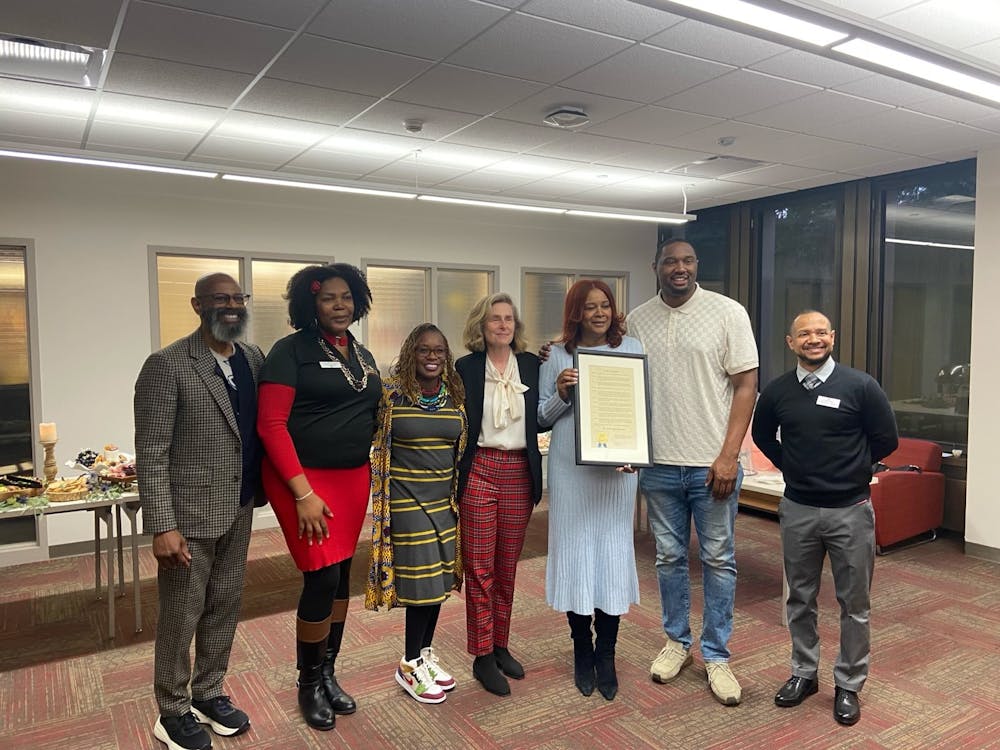E. Danielle Butler gave a presentation about Jessie Maple Patton, the first Black female director and camera operator to be inducted into New York Camera Operator’s Union. In addition to her presentation, Ja Quita Joy Roberts, the Finance and Office Administrator at the Black Film Center & Archive secured a proclamation from Kerry Thomson, mayor of Bloomington, declaring Feb. 1 as “Mrs. Jessie Maple Patton Day.”
“Mrs. Jessie Maple didn't start out a filmmaker,” Butler said. “That wasn't the initial dream.”
Maple Patton was born in Louisiana in 1937, and before filmmaking, led a bacteriology and serology laboratory. Here, she discovered a new strain of bacteria. Shortly after her discovery, she went on to work for several news stations during the 1970s and 1980s as a camera operator.
“One of the things that I love about all of her films is that they are all rooted in community and not just the challenges, but offering a solution,” Butler said.
In 1981, she shot her first feature-length film titled, Will. The film was inspired by the crack epidemic that swept Harlem in the 1970s. It was the first feature-length film captured independently by a Black American woman. With a budget of about $2,000, Maple Patton often had to use family members as actors to cut costs, in addition to wanting to give opportunities to those in her community.
“This was her first film,” Audrey Maple Snipes, Maple Patton’s daughter, said. “She had a dream that she wanted to fulfill, and she had a story that she wanted to tell.”
Smithsonian Media Conservation and Digitization Specialist, C.K. Ming, helped restore Maple Patton’s first film. Ming’s goal was to keep everything as accurate to its original state as possible. The 4K restoration debuted at the IU Cinema on Feb. 1st in honor of “Jessie Maple Patton Day.”
“One of the things that I learned is that the process always starts with a vision,” Butler said. “You have to have a super clear vision that you are unwilling and relentless in pursuing.”
In the 1970s, Maple Patton filed a lawsuit against several news stations for barring her entry into the Camera Operators Union. She eventually won the case in 1973, and the ensuing legal battle was documented in her first book, “How to Become a Union Camerawoman: Film-Videotape," released in 1977. She went on to make another film titled, “Twice as Nice” as well as many other documentaries.
“Six years ago, she had a vision for the next phase of her life, which was to write her second memoir,” Butler said.
Butler was the daughter of one of Maple Patton’s close friends. Butler was hand-chosen by Maple Patton to write her second book, which would be a memoir. The memoir is called, “The Maple Crew.” It picks up where her first book left off — detailing the aftermath of her lawsuit and the years following the trial.
“The process always starts with a vision," Butler said. “You have to have a super clear vision that you are relentless in pursuing,”
In June 2005, Maple Patton donated seven of her films, articles, books, grant proposals, script drafts, film publicity photographs, materials documenting discrimination lawsuits she filed and other materials to the Black Film Center and Archive. The BFCA was established in 1981, and to date, is the only repository in the world solely dedicated to the collection and preservation of historically and culturally significant films by and about Black people.
“She was an icon, filmmaker, author, writer, pioneer and an even better human,” Dr. Novotny Lawrence, the director of the BFCA said.
Maple Patton died on May 30, 2023, in Atlanta, Georgia. The Jessie Maple Collection is being held at the Black Film Center & Archive. Please email bfca@IU.edu, to schedule your appointment.
“Her legacy will continue to live on for many generations to come,” exclaimed Roberts, after she read the proclamation.






